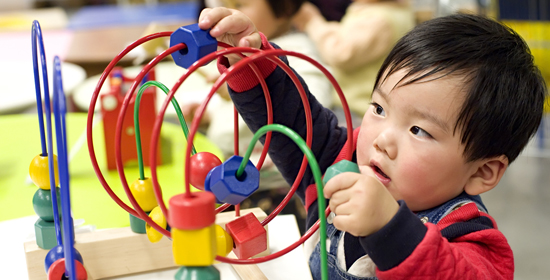Resilience in Infants & Toddlers

Resilience, the ability to bounce back when faced with adversity, is a characteristic that even our youngest children need. Many young children and their families face early stressors in life, such as maternal depression, natural disasters, poverty, violence and homelessness.
These experiences might happen one time, such as the death of a family member, or stressful events can happen over time, such as multiple years of homelessness. Sometimes, these experiences lead to trauma for a child.
Resilience helps children cope with change and adversity, and experience more positive outcomes.
In infants and toddlers, resilience may be strengthened through protective factors found in the family, the environment in which the child lives and plays, and within the child him/herself. The promotion of within-child protective factors is the focus of DCRC — to help all children and adults develop strong protective factors, and thus, become resilient!
Within-child protective factors that strengthen infant and toddler resilience are closely tied to their social and emotional well-being – the ability to form relationships, get their needs met, regulate strong emotions and explore their world.
The Devereux Early Childhood Assessment for Infants and Toddlers (DECA-I/T; Mackrain, LeBuffe & Powell, 2007) is a psychometrically sound, strength-based assessment that measures protective factors in young children ages 4 weeks up to 36 months; specifically, Attachment/Relationships, Initiative and Self-Regulation.
The DECA-I/T consists of two assessments: the DECA-I (Infants) and DECA-T (Toddlers). Both tools are strength-based assessments, normed on a nationally representative sample of over 2,100 infants and toddlers. The DECA-I/T is completed by families (parents, grandparents, foster parents, etc.) and early care and education professionals (teachers, child care providers, home vistitors, etc.), and measures two social and emotional constructs in infants and three in toddlers, and provides scale and total scores.
DCRC Promotes Protective Factors
| Age | Within-Child Protective Factors Definitions | Assessment |
|---|---|---|
| Infant (1-18 months) | Attachment/Relationships; Initiative English Spanish | Devereux Early Childhood Assessment - Infant (DECA-I) |
| Toddler (18-36 months) | Attachment/Relationships; Initiative; Self-Regulation English Spanish | Devereux Early Childhood Assessment - Toddler (DECA-T) |
- Attachment/Relationships: The mutual, strong, long-lasting relationship between a child and significant adults, such as parents, family members and teachers
- Initiative: A child’s ability to use independent thought and action to meet his or her needs.
- Self-Regulation (toddlers): A child’s ability to gain control of bodily functions, manage powerful emotions, and maintain focus and attention (Shonkoff & Phillips, 2000).
Promoting Resilience In Infants and Toddlers
DCRC’s Infant and Toddler Initiative focuses on promoting the health and well-being of babies and toddlers, ages 4 weeks up to their third birthday. Healthy social and emotional protective factors in this group of young children helps babies and toddlers:
- Respond to and provide cues to caregivers about their needs, likes and dislikes
- Foster trust and healthy relationships
- Express strong feelings and communicate needs and wants
- Begin to regulate behaviors and develop patience
- Play well and relate well to others in social situations
Mackrain, M. and Blackwell, K.T, Infant and Toddler Strategies Guide, 2009

The DECA-I/T Helps Programs Meet Various Standards
In addition to helping childcare, home visitation and other early care and education programs such as Early Head Start programs document that children’s needs are being met, the DECA-I/T can help early care and education professionals and families in strengthening the social and emotional development of all children with more intentionality and individualization.
Specifically, the DECA-I/T provides detailed information on children’s social and emotional strengths and needs by scale and even by item. By aggregating individual data, the caregiver can also gain insights into common areas of strengths and needs for a group/classroom as a whole.
The results can then inform an early childhood program or Early Head Start program to be more intentional, perhaps stressing certain social and emotional skills, or providing additional opportunities for practice and feedback by integrating emphasis on social and emotional skills.


